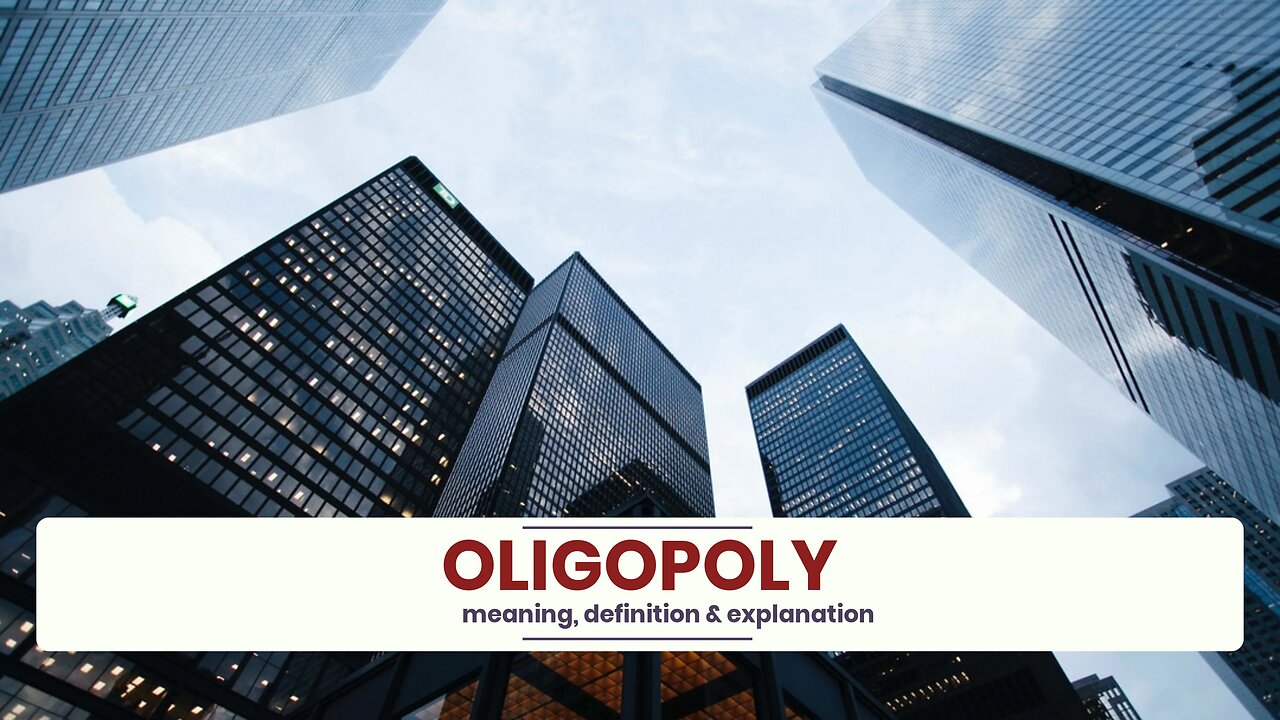Premium Only Content

What is OLIGOPOLY?
✪✪✪✪✪
http://www.theaudiopedia.com
✪✪✪✪✪
What does OLIGOPOLY mean? OLIGOPOLY meaning - OLIGOPOLY definition - OLIGOPOLY explanation. What is the meaning of OLIGOPOLY? What is the definition of OLIGOPOLY? What does OLIGOPOLY stand for? What is OLIGOPOLY meaning? What is OLIGOPOLY definition?
An oligopoly, from Ancient Greek oligos, meaning "few", and polein, meaning "to sell" is a market form in which a market or industry is dominated by a small number of sellers (oligopolists). Oligopolies can result from various forms of collusion which reduce competition and lead to higher prices for consumers. Oligopoly has its own market structure.
With few sellers, each oligopolist is likely to be aware of the actions of the others. According to game theory, the decisions of one firm therefore influence and are influenced by decisions of other firms. Strategic planning by oligopolists needs to take into account the likely responses of the other market participants.
Oligopoly is a common market form where a number of firms are in competition. As a quantitative description of oligopoly, the four-firm concentration ratio is often utilized. This measure expresses the market share of the four largest firms in an industry as a percentage. For example, as of fourth quarter 2008, Verizon, AT&T, Sprint, and T-Mobile together control 97% of the US cellular phone market.
Oligopolistic competition can give rise to a wide range of different outcomes. In some situations, the firms may employ restrictive trade practices (collusion, market sharing etc.) to raise prices and restrict production in much the same way as a monopoly. Where there is a formal agreement for such collusion, this is known as a cartel. A primary example of such a cartel is OPEC which has a profound influence on the international price of oil.
Firms often collude in an attempt to stabilize unstable markets, so as to reduce the risks inherent in these markets for investment and product development. There are legal restrictions on such collusion in most countries. There does not have to be a formal agreement for collusion to take place (although for the act to be illegal there must be actual communication between companies)–for example, in some industries there may be an acknowledged market leader which informally sets prices to which other producers respond, known as price leadership.
In other situations, competition between sellers in an oligopoly can be fierce, with relatively low prices and high production. This could lead to an efficient outcome approaching perfect competition. The competition in an oligopoly can be greater when there are more firms in an industry than if, for example, the firms were only regionally based and did not compete directly with each other.
-
 2:24
2:24
The Audiopedia
11 months agoWhat is AUSTERITY?
83 -
 LIVE
LIVE
Akademiks
5 hours agoDay 4/30. Diddy Trial Day 9. Kid Cudi to Snitch on Diddy over him Blowing up his Car over Cassie!
2,417 watching -
 LIVE
LIVE
Major League Fishing
7 days agoLIVE! - Bass Pro Tour: Heavy Hitters - Day 6
428 watching -
 DVR
DVR
Sean Unpaved
2 hours agoGame 1 Thrills, QB Debates, & Honoring Jim Irsay
21.3K1 -
 35:41
35:41
ArturRehi
10 hours agoSBU Naval Drones STRIKE Black Sea Gas Platforms! (Radar & Warehouses DESTROYED) | Ukrainian Update
1.3K -
 1:00:00
1:00:00
BEK TV
15 hours agoFILLING A LEGISLATIVE SEAT, DEFENDING RIGHTS, AND THE NATIONAL IMPACT OF DAKOTA'S PROPERTY FIGHT
2.75K -
 47:59
47:59
The White House
1 hour agoPress Secretary Karoline Leavitt Briefs Members of the Media, May 22, 2025
27.6K13 -
 2:18:23
2:18:23
Steven Crowder
5 hours agoTrump's Big Beautiful Bill Passes: What's In it and Why is it Making the Left so Angry?
401K202 -
 5:53
5:53
Talk Nerdy Sports - The Ultimate Sports Betting Podcast
1 hour agoAI Sports Oracle: 10 Bets Sharper Than Vegas (May 22nd)
6.35K1 -
 59:28
59:28
Timcast
3 hours agoIsraeli Staffers ASSASSINATED In DC, Shooter Screamed Free Palestine, Mangione Effect
144K127